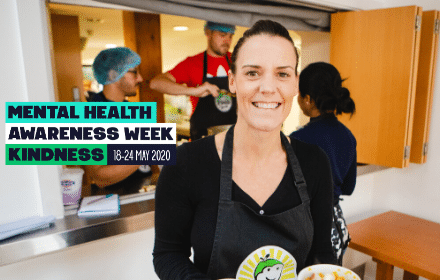This week is mental health awareness week and we’ve been sharing lots of information across our social media channels on the positive impact that FoodCycle has on the mental health of both our beneficiaries and volunteers.
Hosted by the Mental Health Foundation, this year the awareness week focuses on kindness. We experience an enormous amount of kindness here at FoodCycle. From our incredible volunteers, the businesses and companies that donate food, right through to the companies and individuals that fundraise or support us with donations.
We are all living in uncertain times right now and we see day in and day out the incredible kindness spreading through communities across the world but we wanted to take the time to make sure we are being kind to ourselves, so we asked FoodCycle volunteer and counsellor, Negeen to share her top tips.
Negeen | FoodCycle volunteer | East Acton
Stressed? Bored? Anxious? Worried? Lonely? All of the above?
You are not alone!
We live in the time of Coronavirus and these are unusual times. Something we have never experienced before. An extraordinary event has swept the entire world and in a short period of time has changed every aspect of our lives. We have little control over what is happening out there but we can control how we react to it. It is normal that we experience strong feelings regarding what is going on. As human beings we tend to find ways of coping with events. Although some coping mechanisms might be harmful if used long-term, there are a few other ways to manage difficult feelings and to get through these unsettled times:
Make a routine! Like buildings, external structures help contain what is inside. So make a plan for your day or week. Make a list. Set goals. This will give you a sense of control and achievement.
Look after yourself! A healthy mind is in a healthy body. And vice versa: your state of mind affects your physical wellbeing. Anxiety and stress could influence your breathing, your sleep, your appetite, etc. Breathing and relaxation techniques are particularly helpful. They bring your heart rate down and diffuse a general sense of wellbeing through your body.
Talk about your worries! It’s good to talk. It puts your worries into perspective and clarifies your jumbled thoughts and feelings. It is good to have someone to talk to, but if that isn’t possible, even writing things down could help to clear your mind.
Connect with other people! We are social animals. At a time when we have less opportunity to see our friends and relatives face to face, it’s easy to feel lonely and isolated. Thanks to technological advances we have new ways to connect to others. We also look for purpose and meaning in our lives. Helping others is a great way of feeling part of something bigger. It could benefit others as well as yourself.
Prepare yourself! Knowledge is power. Our brain tends to fill in where there is a void. Not knowing and uncertainty about our financial situation, our health and the future of our loved ones could give rise to worrying thoughts and a sense of panic and helplessness. Gathering information from trusted sources and preparing yourself could give you a sense of control and agency.
Our background and personality shape how we react to external pressures. Although some of us might go through our daily lives despite all these feelings, others might feel overwhelmed and incapable to carrying out simple tasks during the day. Remember that professional help is out there. If you are seriously concerned about your own or someone else’s mental health, your usual points of contact are still operating (GP, A&E, 999). Here are some more resources to help and to advise:
NHS – Stress, anxiety, depression and mindfulness
In the meantime keep safe! And remember as once a poet said: “Darkness will fade with the morning and this will pass away, too”!
Negeen, volunteering in the kitchen at East Acton




